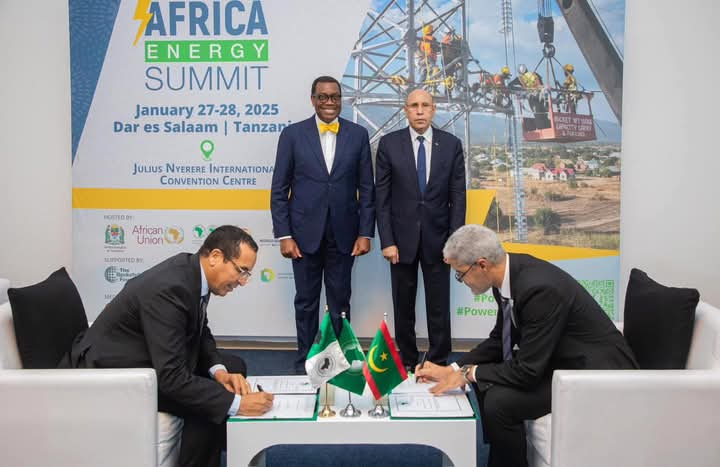The African Development Bank (AfDB) and the government of Mauritania have signed an agreement that promises significant advancements in the country’s livestock sector, which contributes 11% to its GDP. The agreement, finalized at the Mission 300 Africa Energy Summit in Dar es Salaam, was endorsed by AfDB President Dr. Akinwumi A. Adesina and Mauritania’s President Mohamed Ould Ghazouani. This collaboration will see the Bank invest UA18.3 million, covering roughly 85.48% of the total project cost of UA21.4 million.
Mauritania is home to one of Africa’s largest livestock populations, including 2.3 million cattle, 14.6 million sheep, 9.4 million goats, and 1.5 million camels. The country’s unique breed characteristics and grass-fed production make its meat highly valued in regional markets. In 2021, Mauritania exported around 750,000 cattle, mostly to Senegal and The Gambia, generating an estimated $120 million.
Despite this potential, the sector faces several challenges, including inefficient production methods, inadequate feed and water resources, limited veterinary services, and a heavy reliance on natural pastures that are threatened by desertification. Modernization has been slow, and access to markets and commercial inputs remains limited, leading to significant imports of animal products. In 2021 alone, Mauritania spent about $143 million importing dairy products, poultry, and eggs, highlighting the need for reform in the livestock sector.
Project Goals and Impact
The Awkar Programme, a key component of the agreement, aims to modernize the livestock industry by improving production, boosting productivity, expanding processing capabilities, and enhancing access to both local and international markets. The programme will address critical issues such as fodder production, genetic breeding, and animal health services, while also establishing new processing and marketing infrastructure to increase the competitiveness of Mauritania’s livestock products globally. Special focus will be placed on supporting women entrepreneurs in dairy processing, tanning, and leather goods, as well as empowering young people through vocational training and entrepreneurship development.
The programme is expected to directly benefit over 100,000 individuals, including breeders, meat and dairy sector stakeholders, and farmers. Additionally, around 334,000 individuals will benefit indirectly, through improvements in local infrastructure that enhance health, education, and social services in rural areas. Sid’Ahmed Ould Bouh, Mauritania’s Minister of Economy and Finance, expressed gratitude for the partnership, stating that the project would help strengthen local communities and support Mauritania’s broader development goals.
The Bank’s Role in Transformation
The AfDB has been a key partner in Mauritania’s livestock sector transformation since 2021, assisting in project preparation and execution. The Bank’s initial contributions included strategic studies on the meat and milk value chains, identifying opportunities and constraints within the sector. This led to the creation of an ADF Project Preparation Facility, implemented in collaboration with the Food and Agriculture Organization, which carried out pre-feasibility, environmental, and social safeguard studies for the Awkar Programme’s first phase. The resulting investment plan was presented at the Dakar Summit in 2023.
Mohamed El Azizi, the Bank’s Director General for North Africa, emphasized the strategic importance of this project, noting that it is just the first phase in developing Mauritania’s livestock value chain. He added that further phases will follow, with additional resources mobilized to support the entire Awkar programme.
Looking ahead, the Mauritanian government plans to present the Awkar investment plan at a national donors’ roundtable in Paris in April 2025. The goal is to secure additional financial and technical support to fully implement the transformation agenda. The broader vision is to position Mauritania as a leading exporter of high-quality red meat and reduce its dependence on imported dairy products. With the support of the AfDB, Mauritania aims to leverage its livestock resources, creating new economic opportunities and strengthening its role in both regional and international markets.



